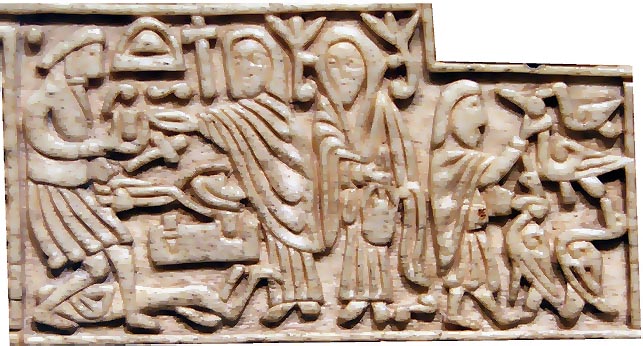A Smith makes me
To betray my Man
In my first fight.
To gather Gold
At the world's end
I am sent.
The Gold I gather
Comes into England
Out of deep Water.
Like a shining Fish
Then it descends
Into deep Water.
It is not given
For goods or gear,
But for The Thing.
The Gold I gather
A King covets
For an ill use.
The Gold I gather
Is drawn up
Out of deep Water.
Like a shining Fish
Then it descends
Into deep Water.
I see some subtle patterns in the poem. Notice the last words of the second lines of the stanzas: man, end, England, descend. There is consonance in the "n." In the third line--fight, sent, water, water--there is consonance on the "t." Water almost rhymes with gather, as well. In the third lines of stanzas 3 and 4, 7 and 8, the ending word is water whence gold is drawn up and then descends. Notice the alliteration in first lines, too: gear, gather, gather (again), and given. The similarity of end, sent and descends is also deliberate, I am sure. There is nothing as obvious as rhyme here, but the patterns of sound make each word choice seem inevitable. Fated, one could say.It is not given
For goods or gear,
But for The Thing.
I don't know about you, but this poem gives me shivers. In that, it suits the story of Wayland Smith, who was seven years wed to a Valkyrie, a chooser of the slain. He was captured and hamstrung by a Swedish king, who forced him to work at the forge. Wayland, despite being crippled, killed the king's two sons and made wonderful, beautiful, but terrible objects from their bones. He raped or seduced (she was drunk at the time) the king's daughter, then he escaped using wings he had built.
Wayland's story was reproduced on the Franks Casket:

He is on the left, at the forge, holding something like a human head in the fire, with a dead body at his feet. He is holding out a cup to a woman. On the left, his brother is catching geese to take their feathers for the wings that Wayland will make.
There is more about him here.
Reading this again, I realized that the Iain Banks book The Use of Weapons is, or contains, an adaptation of the story of Wayland in the character of "the Chairmaker." More than that, I should not say.
No comments:
Post a Comment